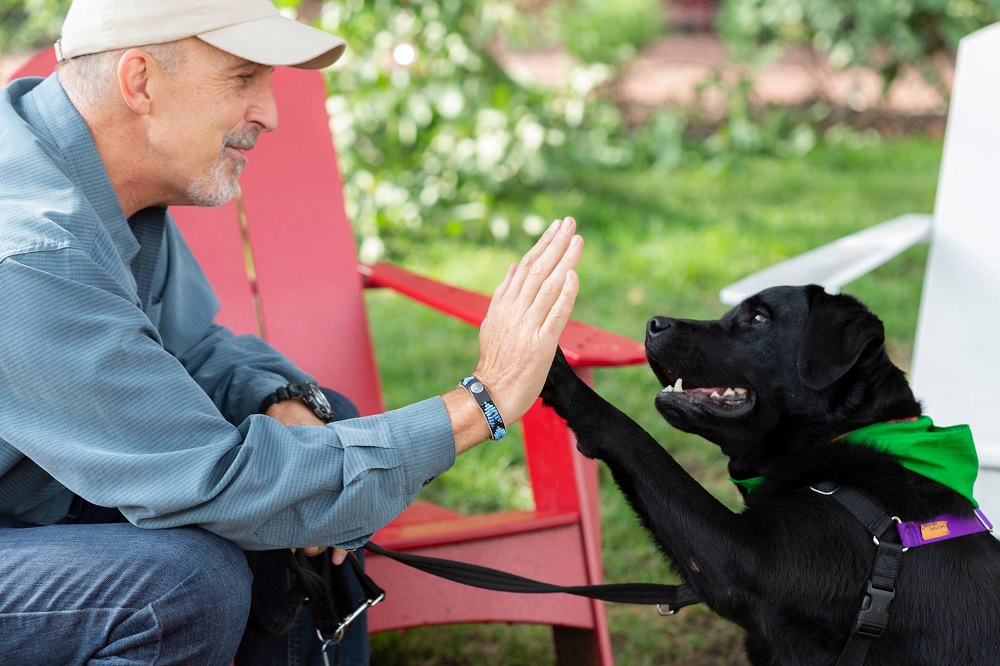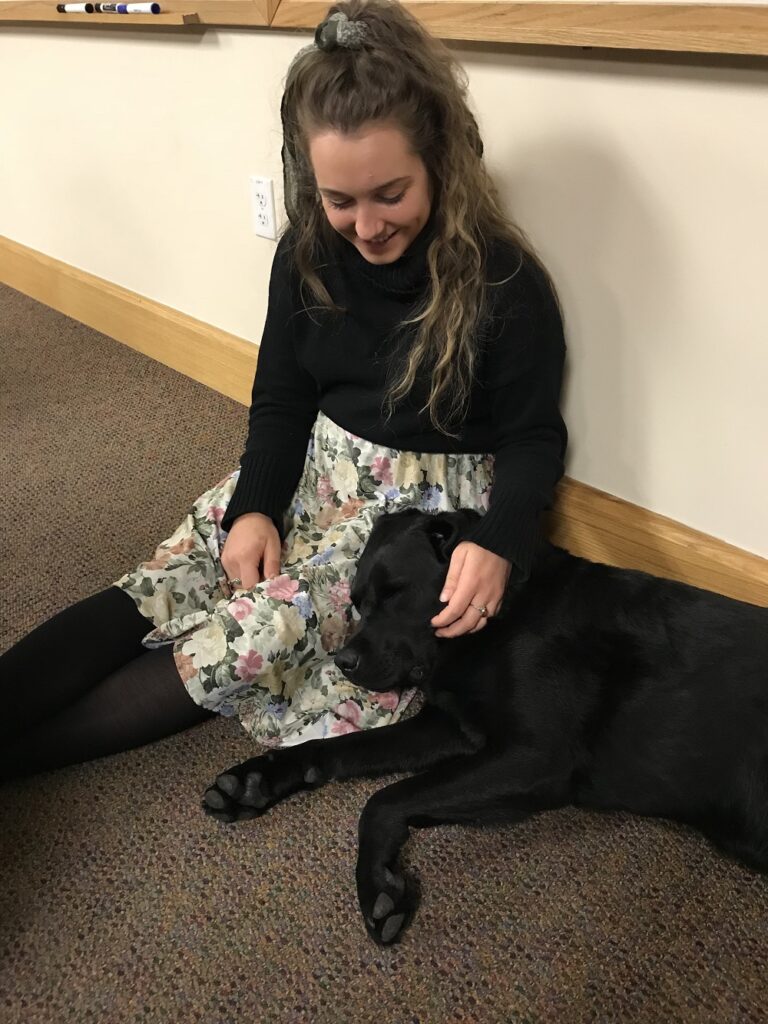Black Lab shines as therapy dog in myriad settings.
All photos courtesy of Philip Tedeschi
The first time Philip Tedeschi saw a black Lab named Samara, he knew she was special. The clinical social worker and founder of the University of Denver’s Institute for Human-Animal Connection was studying how animals can contribute to correctional programs. He happened to be visiting a Colorado prison where incarcerated people train shelter dogs for adoption.
In the middle of a busy prison yard, he spotted Samara draped over the foot of her trainer as she settled in for a nap.
“It was not exactly a relaxing environment. There were people weightlifting, running, other dogs, all kinds of loudspeakers from the prison, you name it,” Tedeschi recalled. “But she looked completely comfortable and relaxed with this individual.”
Since he’d been looking for a dog to work with him at the university, he asked to adopt Samara, and a month later, she joined his family. He soon learned she likes touching people – “almost like holding hands or leaning in” – a trait that has been a boon to her work as a therapy dog both on campus and in the community.
“One of the most endearing aspects of her personality is this capacity for empathy for others,” he said. When Tedeschi was working with the City of Denver in outreach to people experiencing homelessness, Samara proved invaluable. Many people they met in homeless encampments and other settings were wary of police officers and even other humans, but they trusted dogs. Plus, they were often seated on the ground, so a dog can meet them at eye level. Once Samara broke the ice, Tedeschi could start a conversation and offer resources like food vouchers, medical care, identification, and even housing opportunities.

In one profound interaction, a woman at the Denver Public Library was sitting on the floor with her belongings scattered around her, looking down and talking to herself. “If anybody came within probably about a twenty-foot radius of her, she would become agitated and start ranting and talking in weird voices, I think probably as a defense mechanism to keep people away,” he said.
Samara immediately wanted to interact with the woman and sat near her. When the woman saw the dog, she stopped talking gibberish as Tedeschi silently watched. After a few minutes, she started petting Samara and saying, “You wouldn’t hurt me. You wouldn’t rape me. You wouldn’t beat me. You wouldn’t steal from me.”
Samara continued gazing into her eyes. After a little more time, the woman looked at Tedeschi and said, “I used to have dogs. What’s her name?”
“This would be an interesting case example of going from almost psychotic, unintelligible, rambling, maybe even auditory hallucinations and the kinds of things we might see in extreme mental health conditions like schizophrenia to being completely coherent with me in a conversation related to Samara,” he said. “That allows me to build a relationship to literally get her the tools that she needs for her own well-being.”
The Lab has also been successful helping children with early developmental trauma, such as abuse. In one case, a boy who was around seven years old was disruptive in school and couldn’t make any friends because he would become dysregulated riding the bus to the treatment program and then act out. So Samara would meet him at the bus in the morning, and they would walk out to a soccer field to play before school.
The play was therapeutic, as was having her lie on top of him to try to listen to her breathing and heart rate – and match his own breathing to hers.
“The resting heart rate of a relaxed dog is just below that of a human being,” Tedeschi explained. “So if children could match their breathing and heart rate to her, they would begin to bring their own physiological indicators of stress down. The research really has continued to verify that the presence of a safe, relaxed animal – particularly dogs – has the ability to reduce our own stress.”
After a little time with Samara, the child would be ready to go into the classroom and learn. An intern brought Samara to meet him at the bus every day for the entire school year. The Lab started wagging her tail whenever the bus pulled into the stop and would head to greet him. The boy grew so fond of the dog that he would often arrive wearing a Superman cape – so she started meeting him wearing one, too.
“It just set the day right and allowed him to really succeed in that program,” Tedeschi said.
At the University of Denver, Samara frequently offers stress relief to students, which became particularly important during the onset of the coronavirus pandemic. Students who tested positive for COVID-19 had to quarantine for two weeks, and the total isolation could lead them – especially freshmen – to feel lonely, depressed, homesick, and at risk of failing classes.

So Samara and Tedeschi (masked and vaccinated) held special one-on-one visits in a nearby park with them. (He always cleaned Samara thoroughly afterward.)
“The concept of learned helplessness is based on the ‘Three Ps,’ where people see their problem as permanent, pervasive, and personal,” he explained. “Students often feel ashamed to be in this situation. They feel their whole college career is going down the tubes and it’s going to affect their whole lives. Often within a twenty-minute intervention with Samara, they can move out of those distortions into, ‘What am I looking forward to?’ or, ‘What am I studying?’ or, ‘This is temporary.’ They can see around the corner again.”
Now Samara is training a yellow Lab puppy named Juniper for therapy dog work with Tedeschi. But it all depends on whether Juniper enjoys the work, as Samara does. He feels it’s important for dogs to be able to choose their jobs. In the meantime, he’s grateful for all the ways Samara helps him be inclusive of all people.

“Samara doesn’t see people through skin color, through economic status, through disability or unusual behaviors, and things like that,” he said. “She wants to be treated fairly, but she doesn’t judge people on any other element. And I think that makes a big difference.”
Visit The University of Denver’s Institute for Human-Animal Connection online at: https://socialwork.du.edu/humananimalconnection.




